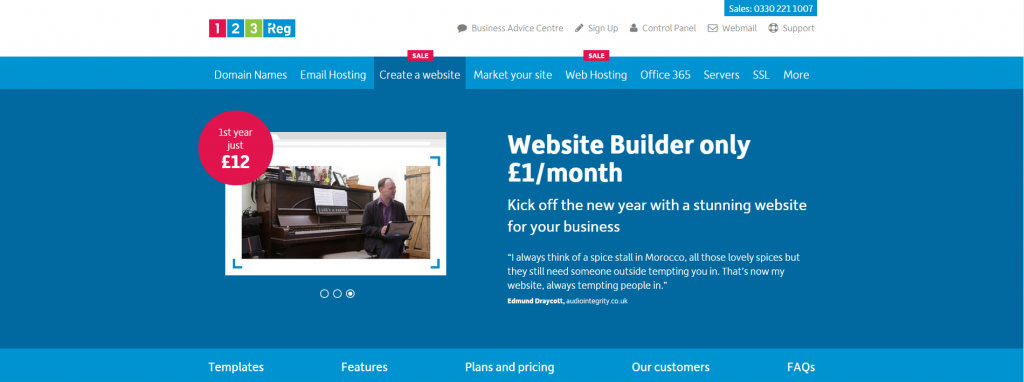The small business guide to collecting customer testimonials
If you’re a regular visitor to the 123 Reg site, you’ll have noticed its undergone some changes recently.
One of those changes has been the introduction of real customers talking about how our products have helped them and their business succeed.
These testimonials, as they’re known, are there to show potential customers that we’re the right business for them.
In this guide, we’ll explain how you can gather your own testimonials so you can use them to convince people to spend their cash on your product or service.
The anatomy of a good testimonial
We’ve already touched on the definition of a testimonial, but let’s spend a bit of time looking at what the best testimonials have in common.
It’s important to understand how testimonials work before you start speaking to customers, because you need to know the kind of information that you should be gathering.
We’ll start with an example from the 123 Reg site.

So what are the key attributes of this Website Builder testimonial?
Let’s start with the obvious – the man who gave us the testimonial, Edmund Draycott, is easily identifiable. He’s named, as is his business and there’s a photo of him.
This adds authenticity – it shows that the testimonial comes from a real customer, talking about his real experience with 123 Reg.
Then there’s the quote. There are two things to note here – first that it’s very brief and secondly it’s focused on one of the benefits that Edmund has experienced while using Website Builder.
As with most web content, shorter is usually better. So you’ll need to conduct interviews that will give you nice little soundbites that you can pluck out.
And you also need to ensure your interviews encourage the subject to talk about the real benefits they’ve experienced using your product or service. It’s no good if someone just quotes your product specs back at you – testimonials are there to show people that you can solve a certain problem they’re facing, so make sure that’s what people talk about when you’re collecting testimonials.
We’ll look more at how to conduct the best possible testimonial interview later in this guide.
Identifying testimonial candidates
Now, you might be tempted to jump in and start asking every customer to provide you with a testimonial, but although that’s a good idea when it comes to reviews, you need to be more selective when it comes to testimonials.
Here are the factors that make a good testimonial candidate.
Loyal and happy
Clearly, you’re not going to get a good testimonial from an unhappy customer. Loyal customers, on the other hand, are likely to have the most to say about what your business has done for them.
A good/unusual story to tell
Testimonials aren’t just about your business – they’re about what your business has done for a particular customer. So if that customer has a particularly interesting story, then it’ll make for a better testimonial.

Natasha Courtenay-Smith’s book “The Million Dollar Blog” made for a great testimonial story
Uses a particular product
Your first aim should be to get one testimonial per product or service. That means when you’re identifying potential candidates you need ensure you don’t end up with ten potential candidates for one product, and none for all your other products.
Obviously you won’t be able to get testimonials for all your products at the same time, but make sure you’re not focusing all your attention on one area of your business at the expense of others.
When it comes to identifying testimonial candidates, small business owners actually have something of an advantage. They fact you’re likely to be hands on at every level of the business means you’ll know off the top of your head who your best customers are and what their stories are. You may even have personal contact with them on a regular basis.
That not only makes it easier for you to identify potential testimonial candidates, but also to convince them that they should talk to you.
Convincing customers to give you testimonials
Once you know what you’re looking for, identifying potential testimonial candidates is actually pretty easy.
But actually convincing someone to talk to you can be a different matter.
Now if you’ve got a good personal relationship with your top customers, things will be a little bit easier. However, you still need to make sure you follow the right approach in order to make the whole process as smooth as possible.
These tips should help you do just that.
Take a softly-softly approach
It might be tempting to just email your best customers and ask them to provide you with a testimonial, but it’s not a good idea. First, you might have someone agree only to discover they’re not actually as happy a customer as you thought. Alternatively, the bluntness of your approach may put off a potentially excellent testimonial candidate who isn’t sure what you want from them and is worried that it will drain their valuable time.
At 123 Reg we normally start with an email introduction. In the email, we’ll outline what we’re doing, why we’re doing it, and why we selected that customer. We’ll write a little bit saying, “We’ve noticed your business, X, is using this product, hey, we really like this about you. We want to speak to you because we’re doing this project.”
Then we’ll move on to a 30 minute phone call, which is more focused on building a relationship with the customer than anything. Although we will ask a few questions just to check eligibility such as making sure their premises is suitable for us to visit and photograph.
Highlight the benefits of taking part
Although some people will give you a testimonial without asking for anything in return, the more you can highlight the benefits of taking part in the project, the more likely people are to take part.
Now the exact benefits you are able to offer will depend on the nature of your testimonial project, and of your business.
At 123 Reg we include testimonial interviews on our blog and in our newsletter, giving the businesses that take part extra exposure. We also send along a professional photographer to our interviews, and give all the images taken to the business owner so they can use them in promotional material, on their website, or anywhere else they need to.

High quality photos, like this one of Edmund Draycott, are a real incentive for people to get involved in a testimonial project
So think about what benefits you can offer to businesses that take part in your testimonial project, and use them to convince people that they should talk to you.
Be upfront about the whole process
The last thing you want is to have someone who’s agreed to provide you with a testimonial pull out on the day, when they discover exactly what they’re being asked to do.
So make sure you’re upfront about the whole process so people understand exactly what will happen.
For example, at 123 Reg we film all of our testimonials and that’s an experience some people may find uncomfortable. If we were just to turn up on the day and start filming, we might find that people suddenly don’t want to talk to us, or that we end up with a really awkward interview which isn’t much use as a testimonial.
Make sure people who agree to give you a testimonial know exactly what they’re in for.
Getting the best possible testimonial
Once you’ve got someone to agree to take part in your testimonial project, you need to ensure you end up with the best possible end product. Here’s what you should be aiming for.
A high quality interview which you can extract quotes from
As high quality images as possible to illustrate your testimonial
If possible, a video recording of the interview.
Let’s consider each of these steps separately.

Getting a high-quality interview
The most important thing here is research. Research will allow you to ask the right questions, and that will mean you’re more likely to get answers that will make for a good testimonial.
You research should focus on two things – Firstly, the history and background of the person you’ll be interviewing and, if applicable, their business. Secondly, the way in which they use your product/service.
This might seem counterintuitive – shouldn’t you be getting this information through the interview?
Well, yes. But if you don’t ask the right questions, you’ll end up with a shapeless, rambling interview that doesn’t serve the purpose it should.
Your research should give you a broad idea of things, while the interview will provide you with specific details which, most importantly, are in your customer’s own words.
So what makes a good interview question? Broadly speaking you should ask open questions, which invite the interviewee to give an extended response and avoid closed questions that can be answered with a simple yes or no.
Don’t ask “Have you enjoyed using product X?”, but instead ask “How has product X made everyday life at your business easier?”
Good research and an understanding of how someone has been using your product/service will help you come up with the right questions.
In terms of interview structure, we’ve found that it’s a good idea to start off with questions about a person’s business in general before moving on to specific questions about their use of 123 Reg products.
Essentially, we’re getting people warmed up by asking them questions about a subject they’re used to talking about before moving on to subjects that they won’t have discussed as often. It’s also a good way to get them talking about how they use your product or service and what impact it’s had on their life.
This is a tactic you can use whether your interviewee runs a business or not – it’s just a case of adjusting the kind of background questions you ask to fit the person you’re talking to
In terms of the actual interview itself, it’s always important to ensure that the recording equipment you’re using is working properly. You don’t want to conduct an interview and later discover that the audio is missing or unintelligible.
Getting high-quality images
If you have the money to spend, then you should seriously consider hiring a professional photographer for your testimonials.
High-quality images make testimonials look great once they’re on your site, and they’re something you can use to convince people to take part.
If you don’t have the money to spend, then take images yourself using the best equipment you can afford.
Even an iPhone on a basic tripod can provide you with good quality images that will bring your testimonials to life.
Also, it’s important to make sure that any photos you take aren’t posed or staged. Capture someone going about their everyday business. That way, it won’t look like you’ve hired models to pose for you.
Finally, make sure you get people to sign a release form allowing you to use their photos.
You can learn more about getting good photos in this guide.
Getting a video recording
Although this is optional, if you can video your interview then you should. A video will give you another piece of content you can use to promote your business. You can add it to your website, use it on a blog article or post it on social media.
It’s an extra piece of bonus content that helps you get the most out of your testimonial project.
If you have a smart phone that can shoot HD video then all you’ll need to buy to shoot a decent video is a microphone and a tripod. You can learn more about creating videos for your business in this guide.
After care
If you’re getting testimonials for a product or service which requires an ongoing commitment from the customer, then you need to ensure you maintain a good relationship with them. It’s not going to look good if you have a testimonial on your site but the customer has actually switched to another service provider.
So simply follow up at regular intervals with these customers and make sure they stay happy. Don’t feel you need to offer them preferential treatment, just make sure that you’re always aware of any potential issues these customers might have so you can address them before they grow into a real problem.
Summing up
By now, you should have a solid idea of how to start collection testimonials for your business. The most important thing to remember is that the focus should always be on your customer and the story they have to tell.
If you want to know how to use testimonials on your website effectively, we’ll cover that in a future post so start contacting customers and check back soon.
